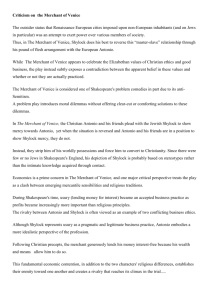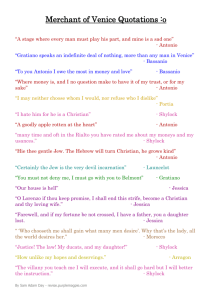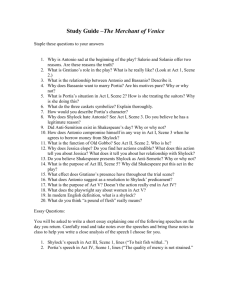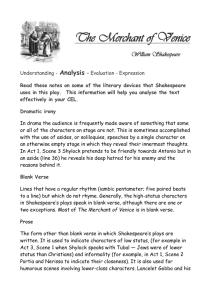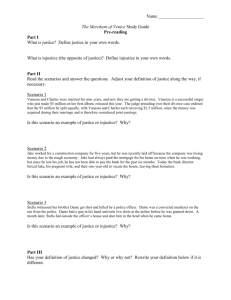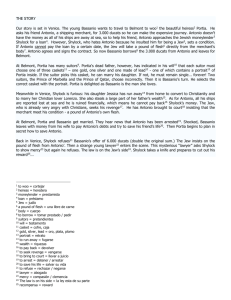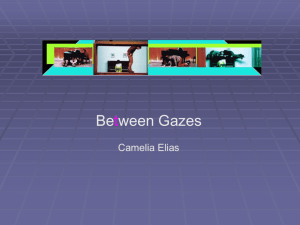The Merchant of Venice
advertisement
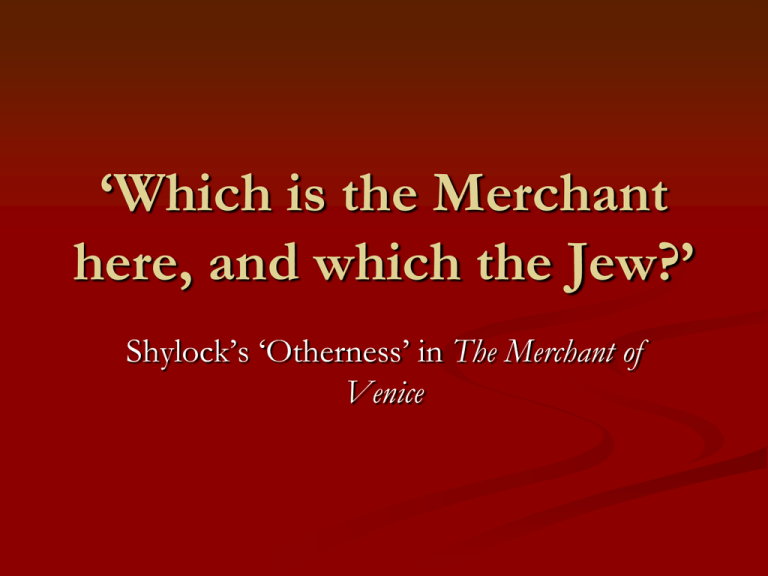
‘Which is the Merchant here, and which the Jew?’ Shylock’s ‘Otherness’ in The Merchant of Venice Mapping characters Antonio Arragon Bassanio Gratiano Jessica Launcelot Gobbo Lorenzo Morocco Nerissa Portia Shylock ‘THEM’ ‘US’ ‘Hath not a Jew eyes?’ D. M. Cohen argues that the moment paints Shylock in an unfavourable light: ‘His speech of wheedling self-exculpation is surely intended to be regarded in the way that beleaguered tenants today might regard the whine of their wealthy landlord: “Hath not a landlord eyes? Hath not a landlord organs, dimensions, senses, affections, passions?” Instead of eliciting sympathy for an underdog, Shakespeare intended the speech to elicit detestation for one in a privileged and powerful position who knowingly and deliberately abases himself in a plea for unmerited sympathy.’ (Cohen 1980: 60-1) The question of Anti-Semitism ‘Is Shylock a money-grubbing usurer eager to take a knife to Christians, or a Lear-like Jew, more sinned against than sinning? How do we reconcile his forced conversion – after he has been stripped of his wealth, his work, and his daughter – with the play’s comic closure?’ (Shapiro 2007) Jewish stereotypes: The Bible The story of Barabbas ‘When Pilate saw that he could not prevail, but rather that a tumult was beginning, he took water and washed his hands before the multitude, saying, “I am innocent of the blood of this just person. See ye to it.” Then answered all the people and said, “His blood be on us, and on our children!”’ Matthew 27: 24-5, King James Bible, 1611 Barabbas as depicted in Mel Gibson’s The Passion of the Christ (2004) Jewish stereotypes: Usury ‘If thou lend money to any of my people that is poor by thee, thou shalt not be to him as an usurer, neither shalt thou lay upon him usury.’ Exodus 22: 25, King James Bible, 1611 ‘And the Lord spake unto Moses in mount Sinai, saying … And if thy brother be waxen poor, and fallen in decay with thee; then … take thou no usury of him … but fear thy God; … thou shalt not give him thy money upon usury, nor lend him thy victuals for increase.’ Leviticus 25: 35-37, King James Bible, 1611 Jewish stereotypes: Greed ‘Their breath stinks with lust for the Gentiles’ gold and silver; for no nation under the sun is greedier than they were, still are, and always will be, as is evident from their accursed usury. … They live among us, enjoy our shield and protection, they use our country and our highways, our markets and streets. Meanwhile our princes and rulers… let the Jews, by means of their usury, skin and fleece them and their subjects and make them beggars with their own money.’ Martin Luther, Von den Juden und Ihre Lügen (About the Jews and Their Lies),1543 Jewish stereotypes: Murder Saint William of Norwich, 1144 Saint Harold of Gloucester, 1168 Saint Robert of Bury, 1181 Little Saint Hugh of Lincoln, 1255 Geoffrey Chaucer’s ‘Prioress’s Tale’ Massacre in York, 1190 York had a small but significant Jewish community. Locals in York grew resentful of their wealth. Following the coronation of Richard I in 1189, a spate of violence against Jews swept across England based on a false rumour that the King had authorised the violence. Edict of Expulsion, 1290 English Jews had to wear identifying yellow badges from 1218 All Jews were ordered to leave England by Edward I in 1290 Most settled in Spain, Germany, Poland and Itlay (Venice, of course, had its own Jewish Ghetto) The edict was not overturned until 1656 The Jew of Malta, c. 1590 BARABAS. First, be thou void of these affections: Compassion, love, vain hope, and heartless fear. Be moved at nothing; see thou pity none, But to thyself smile when the Christians moan. … As for myself, I walk abroad a-nights And kill sick people groaning under walls; Sometimes I go about and poison wells… Roderigo Lopez A Portuguese Jew, physician to Elizabeth I, confessed in 1594 that ‘upon a contract for 50000 ducats he had promised to poison the Queen’: ‘At the Bar, Lopez spake not much, but cried out … that he intended no hurt against the Queen, … and that he had no other meaning but to deceive the Spaniard and wipe him of his money.’ ‘They were all of them condemned, and after three months put to death at Tyburn, Lopez affirming that he had loved the Queen as he loved Jesus Christ, which from a man of the Jewish profession was heard not without laughter.’ (William Camden, The Historie of the Life and Reigne of that Famous Princesse, Elizabeth, 1629. ) Described by his prosecutors as a “vile Jew” Hanged, drawn and quartered on 7 June 1594 Shylock as Jewish ‘Other’ Mary Metzger describes Shylock’s first appearance as ‘the incarnation of the inherently evil Jew of medieval and early modern Christian legend’: scheming, greedy, satanic, and bloodthirsty (1998: 56). SHYLOCK. [Aside] How like a fawning publican he looks! I hate him for he is a Christian, But more for that in low simplicity He lends out money gratis and brings down The rate of usance here with us in Venice. Shylock as Jewish ‘Other’ SALANIO. I never heard a passion so confused, So strange, outrageous, and so variable, As the dog Jew did utter in the streets: ‘My daughter! O my ducats! O my daughter!’ LANCELOT GOBBO. Certainly the Jew is the very devil incarnal… The trial scene ‘…arguably the darkest moment in Shakespearean comedy’ (Berry 2002: 126). The Duke calls Shylock ‘an inhuman wretch / Uncapable of pity, void and empty / From any dram of mercy.’ The trial scene Berry on Shylock’s conversion: ‘Although some critics (mercifully few) argue that from an Elizabethan perspective forced conversion represents genuine mercy, the moment seems intended to shock. By losing his status as “other,” Shylock loses his sense of self. … Acceptance of the “other” seems in this case more malicious than ostracism.’ (2002: 126) Disrupting Shylock’s ‘Otherness’ Portia’s question – ‘Which is the merchant here, and which the Jew?’ – immediately disrupts any stable sense of ‘self’ and ‘other’. Shylock makes a valid point about the Christian characters’ hypocrisy: SHYLOCK. You have among you many a purchased slave, Which, like your asses and your dogs and mules, You use in abject and in slavish parts, Because you bought them: shall I say to you, Let them be free, marry them to your heirs? Why sweat they under burthens? Let their beds Be made as soft as yours and let their palates Be season’d with such viands? You will answer ‘The slaves are ours’: so do I answer you. Disrupting Shylock’s ‘Otherness’ ‘Shylock’s vengefulness marks him as a Jew, an “other” to the Christians, who espouse the doctrine of mercy that Portia enunciates in the trial scene. Yet as the scene unfolds, Shylock’s vengefulness comes to seem almost indistinguishable from a Christian charity that outwits and breaks him.’ (Berry 2002: 131) PORTIA. Down therefore, and beg mercy of the duke. ‘Portia’s eloquent and oft-quoted speech on the “quality of mercy” which, in the context of the trial scene… urges on Shylock a generosity of behaviour that Portia herself will ultimately fail to show toward him.’ (Garber 2004: 283) Disrupting Shylock’s ‘Otherness’ ‘…the certainty of the moral superiority of the Christian / Catholic over the Jew is eroded … by Shylock’s scathing account of his customary treatment by Antonio’ (O’Rourke 2003: 377): SHYLOCK. Signior Antonio, many a time and oft In the Rialto you have rated me About my moneys and my usances: […] You call me misbeliever, cut-throat dog, And spit upon my Jewish gaberdine, And all for use of that which is mine own. […] ANTONIO. I am as like to call thee so again, To spit on thee again, to spurn thee too. As Shylock says himself: ‘The villainy you teach me, I will execute.’ Other ‘Others’? ‘Given the nature of the dominant ideology and social ethos of Elizabethan England, one is not surprised to find in Shakespeare’s comedies biases in favour of aristocratic, male, white, English, heterosexual Christians. In Elizabethan culture, such categories define a normative “self”; those who fall outside them are considered “other”.’ (Berry 2002: 124) By Berry’s logic, nearly all the characters in The Merchant of Venice are ‘othered’ in some way. The whole play becomes about a system in which every character is included somehow, but excluded in another way. Other ‘Others’: Class Antonio as merchant vs. Bassanio as aristocrat Class ‘bonds’: Gratiano to Bassanio Nerissa to Portia Launcelot Gobbo and Old Gobbo to Shylock Other ‘Others’: Race MOROCCO. Mislike me not for my complexion, The shadow’d livery of the burnish’d sun, To whom I am a neighbour and near bred. Bring me the fairest creature northward born, Where Phoebus’ fire scarce thaws the icicles, And let us make incision for your love, To prove whose blood is reddest, his or mine. PORTIA. A gentle riddance. Draw the curtains, go. Let all of his complexion choose me so. Other ‘Others’: Gender PORTIA. …this reasoning is not in the fashion to choose me a husband. O me, the word ‘choose!’ I may neither choose whom I would nor refuse whom I dislike; so is the will of a living daughter curbed by the will of a dead father. PORTIA. Myself and what is mine to you and yours Is now converted: but now I was the lord Of this fair mansion, master of my servants, Queen o’er myself: and even now, but now, This house, these servants and this same myself Are yours, my lord: I give them with this ring. Other ‘Others’: Gender BASSANIO. Sweet doctor, you shall be my bed-fellow: When I am absent, then lie with my wife. All three central female characters in the play blur gender lines by cross-dressing at some point. Berry argues that a similar disruption of categories of ‘self’ and ‘other’ is at work: ‘Each of these characters is a shapeshifter, capable of calling into question the very nature of identity itself.’ (2002: 129) Other ‘Others’: Race, Class, Gender and Religion JESSICA. Nay, you need not fear us, Lorenzo: Launcelot and I are out. He tells me flatly, there is no mercy for me in heaven, because I am a Jew’s daughter: and he says, you are no good member of the commonwealth, for in converting Jews to Christians, you raise the price of pork. LORENZO. I shall answer that better to the commonwealth than you can the getting up of the negro’s belly: the Moor is with child by you, Launcelot. LAUNCELOT. It is much that the Moor should be more than reason: but if she be less than an honest woman, she is indeed more than I took her for. Other ‘Others’: Homosexuality SALARINO. Why, then you are in love. ANTONIO. Fie, fie! ANTONIO. My purse, my person, my extremest means, Lie all unlock’d to your occasions. SALARINO. And even there, his eye being big with tears, Turning his face, he put his hand behind him, And with affection wondrous sensible He wrung Bassanio’s hand; and so they parted. SALANIO. I think he only loves the world for him. Other ‘Others’: Homosexuality ANTONIO. Commend me to your honourable wife, Tell her the process of Antonio’s end, Say how I lov’d you, speak me fair in death: And when the tale is told, bid her be judge Whether Bassanio had not once a love. Antonio promises to pass Shylock’s wealth to Jessica and Lorenzo, not to his own heirs. ‘If Antonio is excluded from the good life at the end of the Merchant, so the gay man is excluded from the play’s address. … It is the Shakespearean text that is reconfirming the marginalization of an already marginalized group.’ (Sinfield 1996: 128) Other ‘Others’: Homosexuality ‘Antonio hates Shylock not because he is a more fervent Christian than others, but because he recognizes his own alter ego in this despised Jew who, because he is a heretic, can never belong to the state. … He hates himself in Shylock: the homosexual self that Antonio has come to identify symbolically as the Jew.’ (Kleinberg 1985: 120) Other ‘Others’ – a final observation ‘Not only were there no Jewish moneylenders in London in 1594, but the hated foreign usurers in London in the 1590s were mostly Italians’ (O’Rourke 2003: 376). References Berry, Edward (2002) ‘Laughing at “Others”’, in Leggatt, A. [ed.] The Cambridge Companion to Shakespearean Comedy, Cambridge: C.U.P., 123-38. Cohen, D. M. (1980) ‘The Jew and Shylock’, Shakespeare Quarterly, 31: 1, 53-63. Garber, Marjorie (2004) Shakespeare After All, New York: Pantheon Books. Kleinberg, Seymour (1985) ‘The Merchant of Venice: The Homosexual as Anti-Semite in Nascent Capitalism’ in Kellog, S. [ed.] Literary Visions of Homosexuality, New York: The Haworth Press. References Metzger, Mary Janell (1998) ‘“Now by My Hood, a Gentle and No Jew”: Jessica, The Merchant of Venice, and the Discourse of Early Modern English Identity’, PMLA, 113: 1, 52-63. O’Rourke, James (2003) ‘Racism and Homophobia in The Merchant of Venice’, ELH, 70: 2, 375-397. Shapiro, James (2007) ‘The Villainy You Teach Me’, Financial Times, January 12. Sinfield, Alan (1996) ‘How to Read The Merchant of Venice without being Heterosexist’, in Terence Hawkes [ed.] Alternative Shakespeares 2, London: Routledge, 12239.

